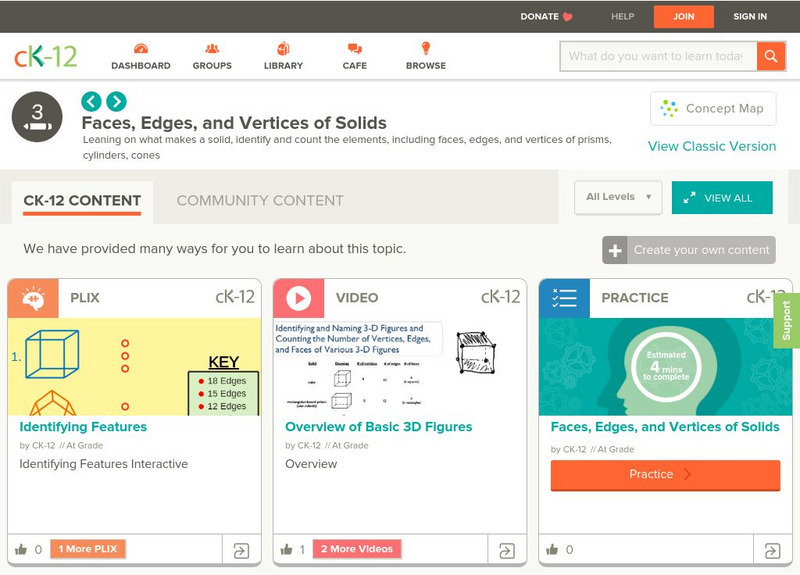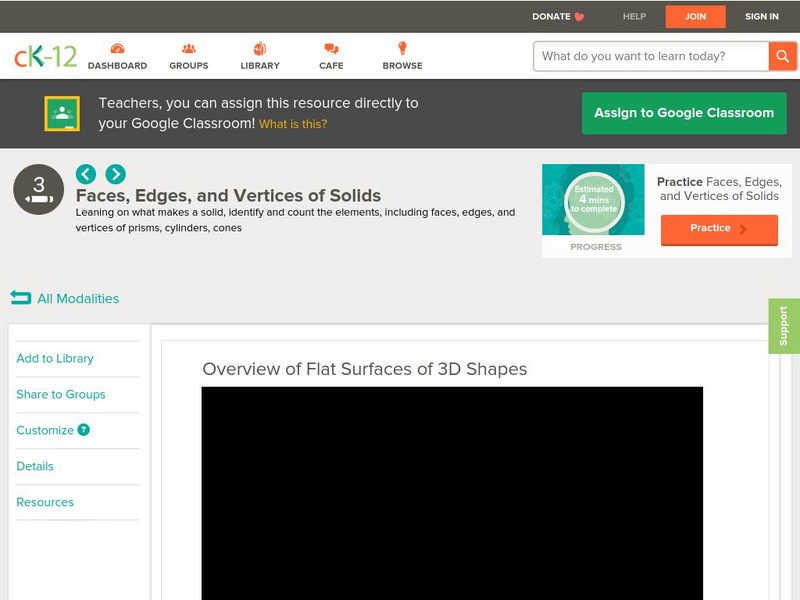Virginia Department of Education
Exploring 3-D Geometry
Take young mathematicians on an exploration of the world of 3-D geometry with this seven-lesson unit. After first defining the terms perimeter, area, and volume and how they apply to the real world, students continue on to learn the...
Utah Education Network (UEN)
Insides and Outsides
Give small groups handfuls of unit cubes and then dare them to build as many rectangular prisms as possible using only 12 cubes. This engaging activity serves as an introduction to the volume of solid figures. In addition to volume,...
Bonneville
Making Observations and Recording Data for Solar Powered Water Pumping
Get pumped about an activity with water pumps. The fifth of seven installments in the Understanding Science and Engineering unit has pupils learn how to make observations, record data, and create data displays. Each group measures the...
Noyce Foundation
Cubism
If cubism were a religion, would you follow it? Lower-level tasks focus primarily on counting the number cubes in a structure and relating the number to surface area. As learners progress to higher-level tasks, isometric drawings and...
Centre for Innovation in Mamatics Teaching
Area, Perimeter and Volume
Develop young mathematicians' knowledge of two- and three-dimensional shapes with this geometry workbook. From learning about the classifications of different shapes and figures to calculating their area, perimeter, and volume, this...
Curated OER
Practice: Word Problems
Congratulations, you've just hit the word problem jackpot! Covering an incredible range of topics from integers and fractions, to percents, geometry, and much more, this collection of worksheets will keep young mathematicians busy...
Illustrative Mathematics
Box of Clay
What happens to a volume when you scale the dimensions of a rectangular prism? For this problem, a box of clay is increased in each dimension, with the intent to see if learners can generalize the result. The addition of physical models...
Primary Resources
Volume (Lesson 1)
Add to your teaching tools an interactive presentation in that it's meant to be used in tandem with manipulative cubes. Each slide asks pupils to create a shape that uses a certain number of unit cubes. They are encouraged to make as...
DK Publishing
Cubes of Small Numbers
Now that geometers know how to solve for square units, can they solve for cubed units? Explore this concept as scholars examine four cubes to solve for volume in each. A detailed example explains this process, but you may consider asking...
Houghton Mifflin Harcourt
Explore Volume - Practice 17.6
When youngsters are first gaining experience with the volume of solid figures, this is a well-suited worksheet. Nine figures, all made of unit cubes, are drawn for your class to estimate volumes with. Two simple test preparation...
Savvas Learning
City Building
First off, this worksheet is adorable! It has seven unit cube buildings drawn on it, complete with trees, paths, and fountains. Upper graders find the volume of each of seven buildings in cubic units. The drawings are attractive, and the...
Teaching Ideas
Volume
After understanding that the volume of a unit cube is one cubic centimeter, math masters determine the volume of four larger rectangular shapes. Then they take the challenge to figure out the volume of seven irregular, cube-containing...
Pennsylvania Department of Education
Volume and Surface Area
Build boxes using unit cubes to compare surface area and volume. The group performs multiple experiments to determine properties of volume, such as if it makes a difference which order the dimensions are multiplied in. Extensive...
University of Texas
Inside Mathematics: Cubes [Pdf]
This task challenges a student to use knowledge of concepts of volume and its attributes to solve problems with rectangular prisms.
University of Texas
Inside Mathematics: Building Blocks [Pdf]
This task challenges students to demonstrate understanding of area, surface area and volume.
Other
West Contra Costa Usd: Volume: A Foundation in Unit Cubes [Pdf]
A very detailed lesson on determining the volume of rectangular prisms, teaching students how to derive the formula for volume, and to use it successfully. Plenty of examples, student work, and assessment options.
University of Cambridge
University of Cambridge: Nrich: Instant Insanity
Excellent interactive challenge working with cube nets to stack them in a specific order. Manipulate the cubes online to solve the problem.
Mangahigh
Mangahigh: Shape: Recognize a Cube and a Rectangular Prism
Test your knowledge of rectangular prisms and cubes.
CK-12 Foundation
Ck 12: Elem Math: Counting Flat Surfaces in Various 3 D Shapes
[Free Registration/Login may be required to access all resource tools.] Students watch a video and attempt practice problems on how to count the number of faces in various three dimensional shapes.
CK-12 Foundation
Ck 12: Elem Math: Overview of Flat Surfaces of 3 D Shapes
[Free Registration/Login may be required to access all resource tools.] Students watch a video overview on the flat surfaces or faces of three dimensional shapes.
Illustrative Mathematics
Illustrative Mathematics: 5.md: Breaking Apart Composite Solids
This exercise helps students understand how volume in figured, even when two or more parts of a prism are not overlapping. There is a teacher view, with a description of the activity and commentary, and a student view, with just the...
National Council of Teachers of Mathematics
Nctm: Illuminations: Volume of a Cube
"The volume of a cube can be developed by considering unit cubes, a single row (longs) of unit cubes or a single layer (flats) of cubes using this applet." This easy software makes it possible to easily construct a cube and take it...
Khan Academy
Khan Academy: Volume With Unit Cubes 1
In this exercise, students practice figuring volume with unit cubes. Students receive immediate feedback and have the opportunity to get hints and try questions repeatedly.
Khan Academy
Khan Academy: Comparing Volumes With Unit Cubes
In this exercise, students practice comparing volumes with unit cubes. Students receive immediate feedback and have the opportunity to get hints and try questions repeatedly.















![Inside Mathematics: Cubes [Pdf] Lesson Plan Inside Mathematics: Cubes [Pdf] Lesson Plan](https://d15y2dacu3jp90.cloudfront.net/images/attachment_defaults/resource/large/FPO-knovation.png)







